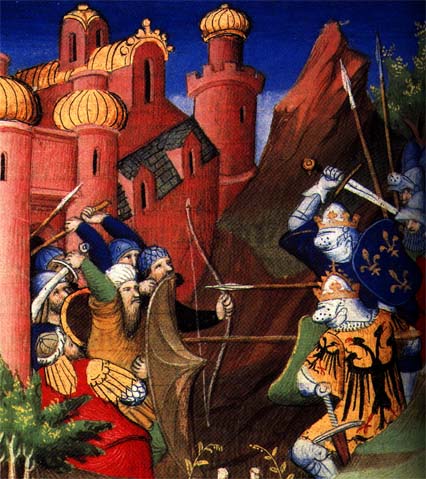
Since September I have been teaching a special topics course on Crusade and Jihad. In my very first teaching jobs, courses on the Early and High Middle Ages at the University of Toronto, the Crusades certainly came up (in the early medieval course they were one of the very last topics); but that was a quarter-century ago. I did not rely on my past understandings of the Crusades this time around, but read a lot of new material, most of which has appeared since 1990 or even 2000. I am particularly grateful to Thomas Madden for putting together a collection called The Crusades: Essential Readings and Christopher Tyerman for his huge new narrative history, God's War.
Here are the new thoughts and perspectives that I gained concerning crusading as a result:
1. Back in the day, I had a very French and English view of the Crusades. Now I take the Germans a lot more seriously. Next, the Italians.
2. I was fascinated by the number of northern European fleets that took part in early Crusades, fleets that were organized across what we think of as national boundaries. It is particularly interesting because we know very little about the people who had the clout and connections to put together such fleets. The maritime world was apparently a different political sphere entirely.
3. The connection between crusading and Imperial ideology fascinates me. This perspective I owe to Christopher Tyerman, who carefully analyzed and described the involvement of King Conrad, Emperor Frederick Barbarossa, Emperor Henry VI, and Emperor Frederick II. Not to mention the would-be Emperor Charles of
4. Having not read a lot of German accounts the Crusades, Tyerman's book was the first to make me aware how odd it is that we (or at least I) take almost without thinking the side of Frederick II’s enemies when evaluating the significance of his crusade to Jerusalem.
5. Perhaps most valuable to me is that reading lots of primary and secondary accounts of wandering crusading armies renewed my awareness of warriors as constituting for some purposes a separate society, battening on the settled communities through which they traveled. This awareness will come in useful when I write my next book, Men at Arms.
As far as what I learned about jihad this fall: I learned, thanks to Carole Hillenbrand, David Cook, Patricia Crone and Capt. John "Garick” Chamberlin, among others, that there's a lot to learn and that systematic historical discussion is just getting underway.
Image: a French king and a German emperor fight a sultan.
The question about Frederick II is a very good one. Not habitually working that late, when I came across a translation of his letter to the West proclaiming the treaty in a sourcebook, I was amazed I'd not heard of this achievement; then when I went back to my books, discovered it was because it's usually dismissed inside a couple of paragraphs. It just seems very unlikely that it was that small a deal at the time!
ReplyDeleteYou should start coming to SSCLE conferences. 2012 in eastern Spain, 800 years after Las Navas de Tolosa.
ReplyDeleteDavid Perry